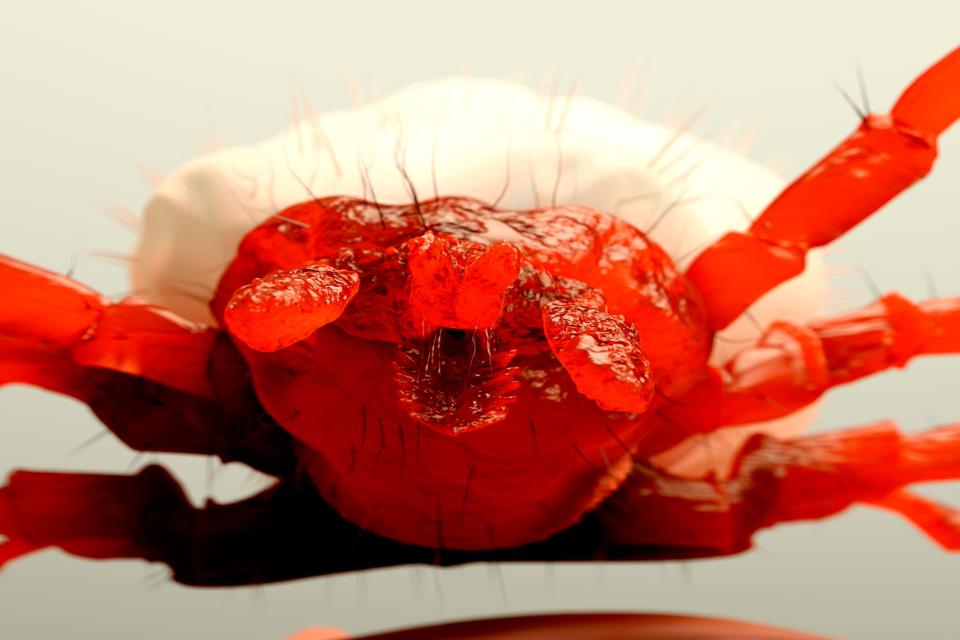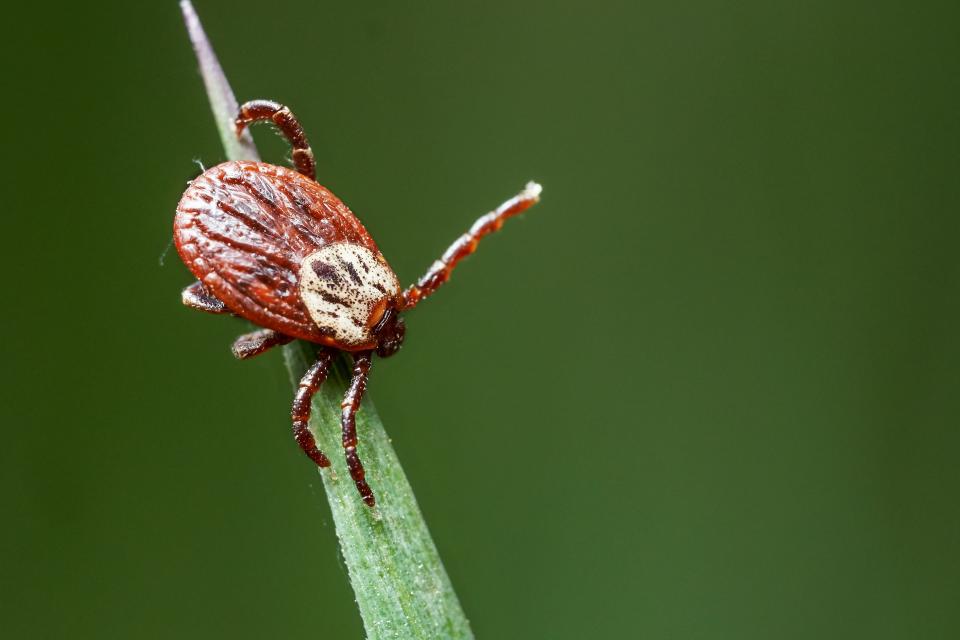Ticks die when they bite him. This man's immunity to ticks could pave the way for a tick vaccine.

- Oops!Something went wrong.Please try again later.
Richard Ostfeld gets a burning, itchy welt after a tick bite but has never gotten sick from one.
Research suggests histamine in the blood kills the ticks long before they can infect him.
He has acquired tick resistance, which may help guide research and development of a tick vaccine.
When ticks bite Richard Ostfeld, they die — not because he's particularly vigilant about squishing them, but because his immune system attacks as soon as it senses their presence.
He is one of the rare individuals who has developed acquired tick resistance.
How does ATR work?
Thanks to his work as a community ecologist, Ostfeld often roams through tick-infested territory, and hundreds of ticks have bitten him over the years.
He said all these bites have trained his immune system to recognize and attack certain proteins in the tick's saliva. (But don't go searching for ticks just to try and build immunity, since you might contract a debilitating tick-borne disease.)
When a tick starts sucking blood, white blood cells rush to the scene and release an inflammatory chemical called histamine. Researchers aren't fully sure how histamine kills ticks, but it does the job quickly.

"I develop an itchy, burning welt at the site of the tick bite, shortly after the tick attempts to embed its mouthparts," Ostfeld said.
The welt lasts a few days, but it's harmless for him. For the tick, not so much.
Why does tick immunity matter?
This rapid tick death isn't just karma for stealing Ostfeld's blood — it also protects him from tick-borne disease, such as Lyme disease or babesiosis, which can damage organs and cause long-term disability.
These diseases come from bacteria and viruses, collectively known as pathogens. Which pathogens local ticks carry depends on the species and where you live.

In the northeastern states, Ostfelt said one-third of ticks carry the bacteria that cause Lyme disease (Lyme borreliosis). He added that roughly one in five ticks can infect you with babesiosis, and one in 10 can cause anaplasmosis.
Given those odds, one of the hundreds of ticks that have bitten Ostfeld probably carried pathogens, but the ticks died before their infectious saliva could invade his body.
"It takes hours to a couple of days for any pathogens to leave the tick and enter your body," Ostfeld said.
Because his immune system kills the ticks off so quickly, "they are never able to transmit pathogens to me."
Tick diseases are becoming more common
Ostfeld is by no means the only person with ATR, but so few people report it that scientists don't know how common or uncommon it is.
But many people are still vulnerable to tick bites, and that is a growing problem.
"There clearly has been an increase in recent decades in the incidence of tick-borne disease in the human population. That's true nation-wide," Ostfeld said.

The latest US Centers for Disease Control and Prevention data reported 50,865 cases of tick-borne disease across the US in 2019. Lyme disease in particular has flourished, with the rate of cases doubling between 1991 and 2018.
"That is not due to an increase in the proportion of ticks that are infected," Ostfeld said. Rather, it's because tick bites in general are becoming more common, he added.
One major reason for the explosion of tick bites is climate change. Ticks used to avoid colder states in the north like Alaska and Maine. But as these areas have grown warmer, ticks have expanded their hunting grounds.
The length of ticks' hunting season has also expanded. "When springs come earlier in the year and the winters come later, then the ticks have a longer period of time to find a host," Ostfeld said.

Even if the tick chooses to feed on a pet or wild animal, they can easily carry the tick to nearby humans. In other words, ticks can still find you even if you haven't walked through tall grass in years.
Can we use acquired tick resistance to fight back against disease?
Some humans and animals develop tick immunity naturally as they encounter ticks in their lives.
Scientists have also induced ATR by feeding ticks on animals like cattle, mice, and guinea pigs until their immune systems gradually learned to kill the ticks off.
There have not been any studies in which scientists have induced ATR in humans. But Ostfeld said some research labs are looking into the possibility. It's just a tricky process, given that a vaccine could trigger an auto-immune response if it attacks the immune system too broadly.
Moreover, some people naturally have severe tick allergies, developing anaphylactic shock after a bite, so researchers are being very careful that their vaccine doesn't replicate that.
Despite the challenges, Ostfeld said ATR is still worth looking into. "In my mind, a very promising direction is to develop a vaccine against the ticks themselves, against the right choice of proteins and antigens in the ticks' saliva."
The Lyme disease vaccine currently in development would only protect against the bacteria Lyme borreliosis, meaning you could still get other tick-borne diseases. But a vaccine against tick saliva could theoretically teach your body to kill ticks, protecting you against all the pathogens inside them.
"I think it's a very important direction for research to protect us against all the tickborne diseases that are circulating and the new ones that will arise, almost certainly, in the next couple of decades," Ostfeld said.
Perhaps one day, we'll all have immune systems as skilled in tick-killing as Ostfeld's.
Read the original article on Business Insider

